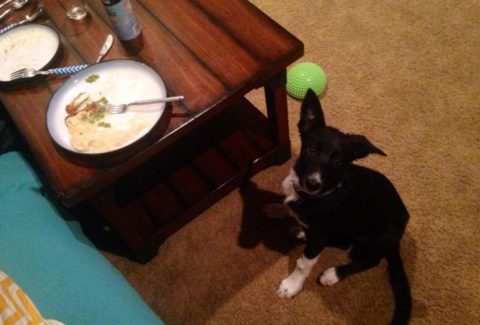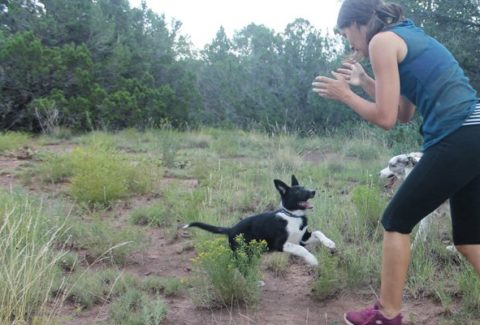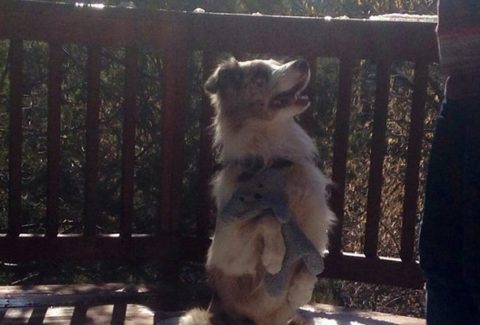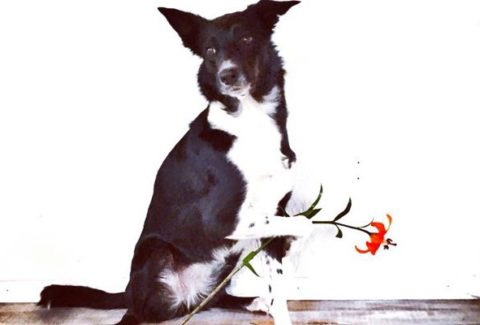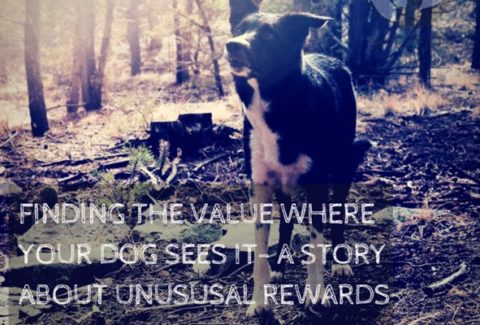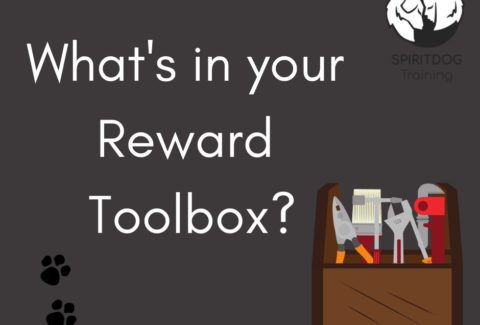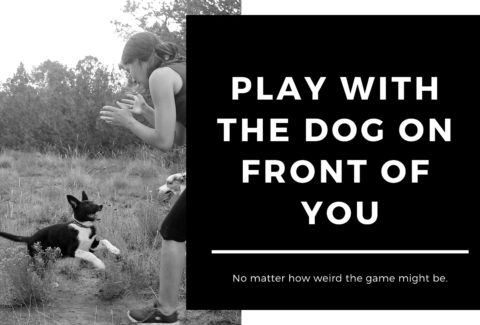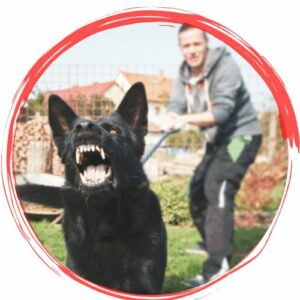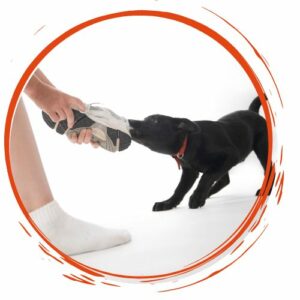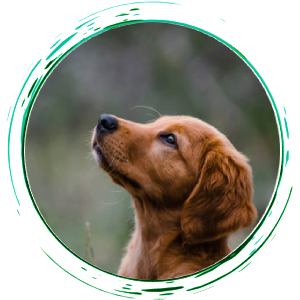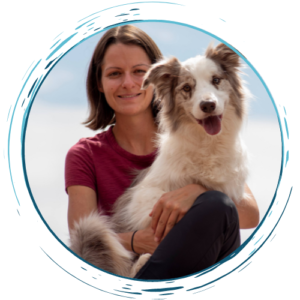Why You Should Reward Your Distracted Dog (Sort Of)
May 7, 2021 2021-06-26 12:51Why You Should Reward Your Distracted Dog (Sort Of)
Why You Should Reward Your Distracted Dog (Sort Of)
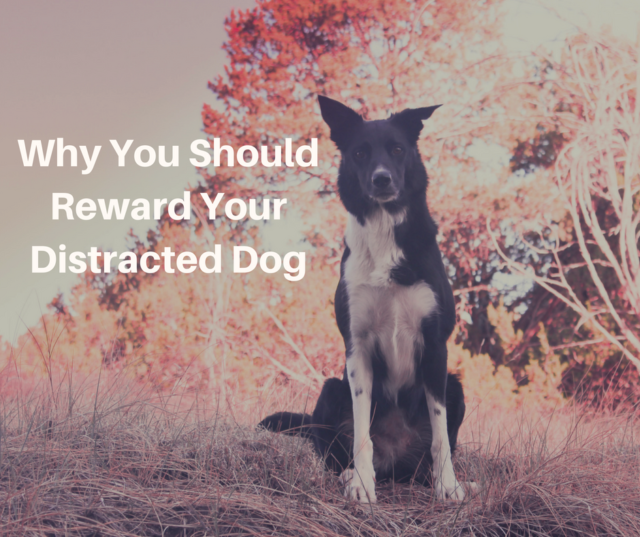
We have all seen (and probably been in) the following situation many times: A dog is pulling on his leash, trying desperately to go and smell a bush or climb up on another person or go and greet a different dog. The owner has his whole hand in the loop at the other end of the leash, holding on and trying to get the dog’s attention by tugging on his collar and calling his name, mixed up with with exclamations of “No! Stop. Leave it. Watch! Watch me!” His arm is close to being pulled out of the shoulder socket, the dog’s nails dig into the ground in a desperate effort to get to his goal.
He doesn’t seem to recognize his name in the least or care about the person on the other end of the leash and the owner grows increasingly frustrated, making the dog even less likely to want to engage with him.
How can we prevent these situations from happening, and how does rewarding the dog actually make him less likely to seek out his fun from everything but his handler?
Dogs (and all other animals) are driven to seek resources, reinforcements, and anything else that makes them feel good. They are on a continuous quest to increase the amount of food they eat, the fun they have and the happiness they experience.
Just like humans, they will continue to seek this happiness and feel-good emotions where they have been finding them in the past – similar to the way that we eg take up and pursue a hobby because it consistently makes us happy.
Dogs are also innately curious. This characteristic combined with their drive to pursue their own fun is what results in the dog who seemingly forgets us on the other end of the leash. The dog is hungry for experiences, hungry for novel fun (and maybe also just hungry for food – some breeds are constantly scanning their environment for the next potential snack!). He has learned that ignoring his handler and going on his own adventures (as far as his leash radius allows – or even very far if he is taken off the leash) is a sure way to have a good time.
I usually watch handlers call their dog’s name and several different commands in these situations, then I interrupt them to point out that they just have used their dog’s name 7 times, as well as the watch me command 4 times and the leave it 3 times…and all this without ANY reaction.
Dogs are always learning, not just when it is time training time. Is that really what we want them to learn? That we will give them a dozen cues and not one needs to be heard and followed? To make matters worse, the dog does not just learn that ignoring us is normal – he learns that by ignoring us, he gets to enjoy his fun. This is a very bad lesson for him to learn, und unfortunately one that he will internalize more and more every time we let these situations happen.
What I recommend doing instead is that as soon as the dog goes into scouting mode, you take a treat, hold it directly in front of his face and when he turns his attention towards it, you start playing. It can be a game of chasing the treat, chasing you, running around….whichever is the most fun for you and your dog. The important part here is that this happens quickly, as soon as the dog disengages.
Many dogs are easily distractible which we tend to see as a bit of a flaw.
We need to use this in our favor though:
They are also usually easily distractible from the initial distraction.
A dog that goes to sniff a bush can be re-engaged with his handler in a second, and when the handler stops the interaction the dog has usually forgotten what he was going for in the first place. Try it!
Does this reward the dog for being distracted? That is an important question to ask.
I don’t think so, for 2 reasons:
1. The dog tells us what he gets rewarded for.
Dog training is a trial and error field. It is impossible to predict what a dog thinks and how exactly our training will effect him without going out and giving it a try. As humans we tend to really like to make predictions based on prior experiences, or even purely theoretical knowledge without experience. In dog training this often doesn’t work. While it may sound sensible that we should “Never Reward Fear” this is concept does not apply to emotions (for an explanation see here).
In all cases in which I have recommended the above method the dog quickly became more attentive and less immersed in his own journey. It seems to be working. If your dog gets more distracted, of course you need to change it up!
However I don’t think he will, because:
2. All behavior gravitates towards the reward.
This is probably one of the most important dog training principles I know. Dogs clearly participate in training because they get something out of it. And they will try to move towards this outcome. Very often we can utilize clever reward placement to improve or even create a behavior.
(For dogs who have trouble to hold a stationary position like a down at a distance for example, shown by them creeping towards you or getting up early, try throwing the reward behind them. The expectation of its placement will let them stop gravitating towards you, and sort of “pull” them back. You can even use alternating rewards – some from you, some in position, some behind them – to further balance and perfect the position.)
Since it will be clear to the dog that the reward is presented by you, and that the game attached to it is just as (and hopefully more) valuable than the actual treat, it is very unlikely that he will seek out to earn it by sniffing for it on the ground.
He will instead engage with the source of the treat he is going for – and this is you!
(Of course, don’t just toss the treat in front of his nose without further ado – it is an initiation of an interaction with you.)
Try to not nag your dog when he is disengaged – especially not by telling him Uh-Uh or No or wasting your cues such as his name. Instead, engage him in a way that is much more likely to get his attention quickly as well as build a lasting bond through play.
Happy Training!
(Need more advice for your easily distracted dog?
Why I Don’t Train Eye Contact
A Story If Unusual Rewards
How To Get A Dog Who Won’t Leave Your Side
7 Tips For The Dog Who Runs Away On Walks
What’s In Your Reward Toolbox?
A World Of Rewards )



